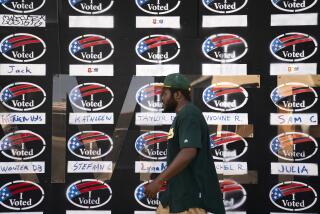God Save the Americans
- Share via
LONDON — London is bewildered by the latest manifestation of U.S. politics. Not that this is new. The British find America inexplicable at the best of times. Their media produce endless reports from America in which the subtext is always: “If you thought that was odd, just look at this.” The States, for us, is an English-speaking Japan, a looking-glass world in which money, Hollywood, religion, extremism, salesmanship and provincialism combine in a dance to subvert what Europe regards as normal.
One favorite at the moment is a BBC TV program called “Louis Theroux’s Weird Weekends” (also available on cable in the U.S.), in which Theroux, a stereotypically nervous, gangly, quietly spoken British nerd encounters his polar opposites: various genres of fast-talking, over-confident U.S. fruitcakes, from charlatan hypnotists and cultist body builders to pornographers of the obese and backwoods neo-Nazis. Often they seem sad figures who get off on exploiting even sadder ones, though Theroux’s faux-naive questioning can also reveal their desperation and humanity.
Fascination for Theroux has been supplanted in the last three weeks, however, by the U.S. presidential election. We began gasping on election night, when we realized that U.S. news organizations were predicting the results before all the polls had closed. In a British election, a news blackout operates while polling goes on. Once the voting is over, the day’s exit polls--by MORI, Gallup and other leading pollsters--can be made public, but while voting is under way, speculation about the result from any source is banned from the airwaves. The most we can learn from our radio and TV is which candidates are on the ballot in any area and how the weather has affected voter turnout.
All media organizations abide by this code on pain of losing their license to broadcast, because we believe that report ing during polling can affect outcome. We infer from what we have seen that the Federal Communications Commission has no such grip on the news organizations it regulates, and we can’t understand why not. Money? Hollywood? Religion?
That’s just for starters. We’re also baffled by the impasse in Florida. We don’t understand why voters have to make holes using a machine that may not make holes well enough to convince another machine that hole has been made. We don’t understand how absentee ballots can continue to pour in by mail and be eligible for counting up to 10 days after an election has passed. We don’t see how election officials can announce a result before all those votes are counted, even when there are fewer absentee votes than the margin of victory. And we’ve struggled to understand what the word “chad” means and how it could spring upon us fully formed and self-confident, as if intentionally making us appear unworldly.
And why is everyone saying that the delay in reaching a result means that there is something intrinsically wrong with the U.S. electoral system? If 50 people vote one way, and 50 people vote another, it doesn’t matter what machinery you use: You’ve got a standoff and one that will have to be decided by established means or new. Either is likely to be long-winded, unless the candidates agree to take the White House on a time-share basis. That’s frustrating, but speed is not always of the essence; transparency and legitimacy are.
We’re bewildered by Gov. George W. Bush’s impatience to get his feet under--or on-- the desk in the Oval Office. The Texas governor, buoyed by James A. Baker III, has behaved since the election as if his wish to have won was tantamount to his having done so. Doesn’t it matter to Bush that his installation as next president was shown to be the end-product of a legal process rather than some kind of Nietzschean act of will? Does he know who Nietzsche was?
But we are most bewildered--and saddened--by Al Gore. So he has lived his life preparing for this moment. So he has high office in his genes. But in what way, since failing to wrap up Florida, has he shown the moral stature that should accompany the office of America’s chief executive? Objecting to dubious counting procedures in a state presided over by George W.’s brother is one thing. What we have been waiting for is some sense that Gore sees both himself and his rival as equally diminished by electoral glitches. We know Gore wants to win. We’re baffled that until this week, no one had seen fit to advise him (or maybe he wasn’t listening) that there is more at stake here than just his own political future. Even now that he has begun playing the statesman, he continues to compromise the moral high ground of recounting by hitching it to his own interests. A political plum seems to have dropped through his overeager fingers.
Theroux will probably return to the U.S.A. for a new series of weird weekends in 2001. On current evidence, there’s every chance that one group of hucksters to bring a bemused grin to his vacant face will be this year’s presidential candidates. Meanwhile, there is already jokey talk in London of pouring oil on America’s partisan waters by flying in a team of international monitors from our former colonies in Zimbabwe, Nigeria and Sierra Leone, all of which have useful up-to-the minute experience of running elections. An e-mail has also been doing the rounds, announcing that in light of America’s failure to elect a president and thus to govern itself, American independence is hereby revoked and that her sovereign majesty Queen Elizabeth II will forthwith resume monarchal duties over all states, commonwealths and other territories, “except Utah, which she does not fancy.”
More to Read
Get the L.A. Times Politics newsletter
Deeply reported insights into legislation, politics and policy from Sacramento, Washington and beyond. In your inbox twice per week.
You may occasionally receive promotional content from the Los Angeles Times.








